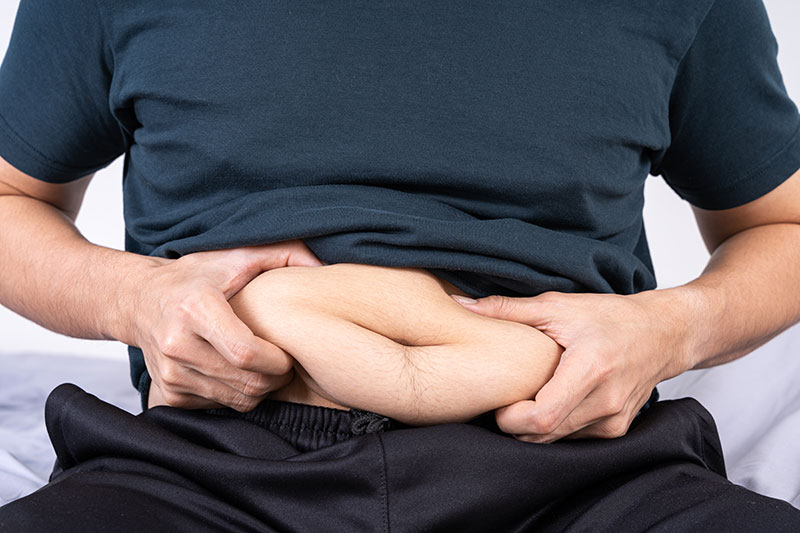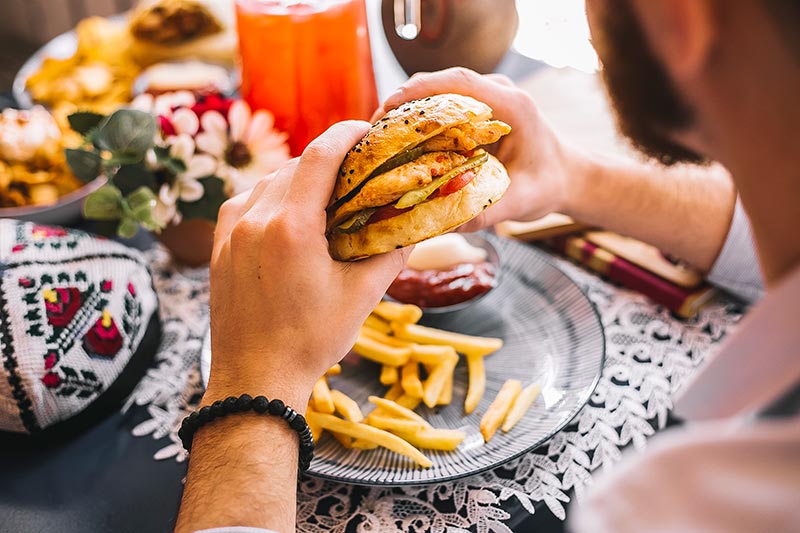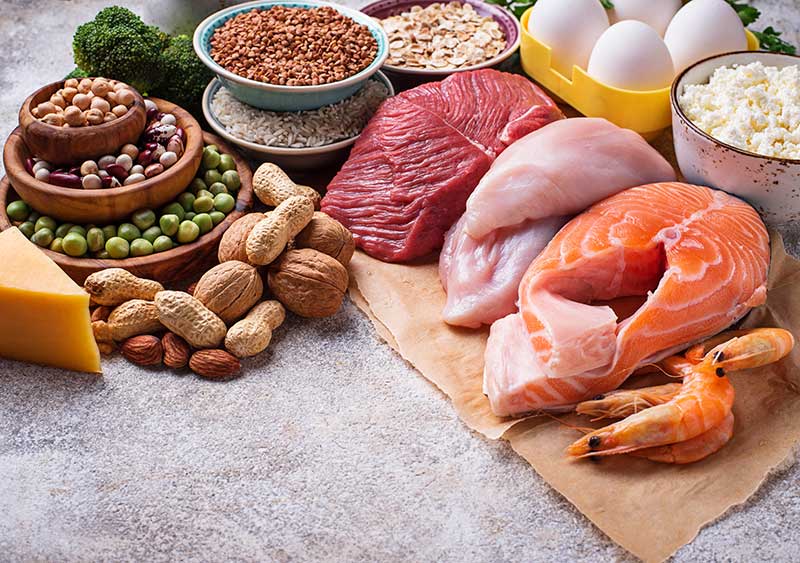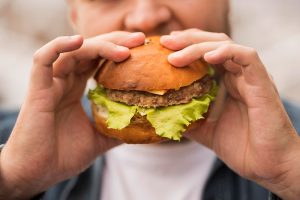Although weight loss is usually the common goal, many of us are more interested in gaining weight for more specific reasons.
In the bodybuilding world, gaining weight is typically achieved through a dirty bulk.
Sure, you’ve probably heard of the term “bulking up” but what does dirty bulking really mean?
We take a look at how a calorie surplus diet really works in the world of dirty bulking.
What is a dirty bulk?

When you want to get stacked, a dirty bulk is one way of working within a calculated calorie surplus alongside resistance training – leading to muscle and strength gains.
But what is a calorie surplus diet? Well, during weight loss, the aim is to work within a calorie deficit – so that you’re burning more calories than you’re consuming. While during a calorie surplus diet you consume more calories to gain weight.
The aim of a dirty bulk is to consume more calories than you’re burning off, leading to weight gain in the form of either muscle or fat. While a clean bulk involves eating plenty of whole and unprocessed foods, a dirty bulking cycle is much more… By any means necessary approach.
Yep, a dirty bulk diet takes bulking to a new level of weight gain. While a dirty bulk is usually paired with plenty of strength training, a dirty bulk diet means that no foods are off-limits.
So, yes, you can pretty much eat whatever you like during a calorie surplus diet (dirty bulk).
Of course, this huge switch up in calorie intake can feel a little daunting for those who are new to dirty bulking. In this instance, many guys turn to high calories shakes and mass gain powders to support their dirty bulk gains.
Does dirty bulking work?
There’s no denying that a dirty bulk can help you gain weight, however, it’s not uncommon to question whether dirty bulking is effective long-term.
So, let’s kick things off by taking a look at the benefits of dirty bulking.
Maintain a calorie surplus diet
Although weight loss is a more common goal than gaining weight, many of us find both of these quite difficult.
So it comes as no surprise that dirty bulking is a popular go-to for those looking to up their weight and get some serious strength. For men looking to gain weight, a calorie surplus diet in the form of a dirty bulk can be an effective way to pack on some pounds.
Also Read: Legal Steroid Alternatives That Work Fast
However, in order to gain weight and convert these gains into muscle, some serious resistance training is needed along the way. This is something that quite frankly cannot be ignored during a dirty bulk.
If you find it difficult to gain weight, dirty bulking could be an effective route to do just that.
Promote muscle and strength gains

According to research, in order to gain muscle, a sufficient calorie surplus diet is needed – this typically sits at around 10 to 20% additional calorie intake. However, a dirty bulk usually goes beyond this range when combined with sufficient weight training.
Whether you’re in bodybuilding circles or taking part in team sports, programmed weight gain through dirty bulking is a common method to promote muscle and strength gains.
Does dirty bulking have downsides?
While a calorie surplus diet in the form of dirty bulking will certainly help you gain weight, there are some side effects you may want to look out for.
Of course, dirty bulking results could lead to muscle and strength gains, but naturally, consuming high calories through a dirty bulk can have negative results, too.
Potential excess fat gain

While it may be easy to follow a calorie surplus diet (dirty bulk!), calorie intake isn’t always tracked – meaning that it may lead to excess fat gain.
When paired with strength training, some of this weight will be muscle gains, while a sizable amount will be fat mass.
A dirty bulk diet can be a great go-to for adding weight, however, too much fat can lead to a lack of definition in your muscle shape and size. So if you’re planning on competing, an excessive fat gain can do more harm than good.
Whether you’re an athlete or bodybuilder competing in physique sports, a dirty bulk diet has the potential to leave you out of shape.
Potential health risks

As well as gaining excess fat during your dirty bulk diet, this extra fat could also have other potential health effects.
Unlike a clean bulk that promotes eating healthy, whole and unprocessed foods, dirty bulking means that no foods are off-limits – leading to a high intake of processed carbs and saturated fats.
As we all know, too many unhealthy, saturated fats are bad for our bodies. Therefore, consuming too many of these foods can lead to high cholesterol and blood sugar levels, with increased risks of high blood pressure, cancer, type 2 diabetes and even strokes.
However! It’s important to note that studies into the consumption of these type of foods typically consumed during a dirty bulk were conducted in non-exercising participants.
Also Read: First Steroid Cycle – Beginners Guide to Safe Steroid Cycling
This could lead us to believe that a dirty bulk diet could be beneficial when paired with exercise and strength training.
Feeling sluggish during a dirty bulk

When you’re eating a lot of processed, sugary foods, it’s natural to feel quite sluggish during a dirty bulk.
Think about it, after chowing down on a pizza or a burger and fries, it’s easy to feel as though we regret eating it afterwards. Packed with large amounts of refined sugars and sodium, these type of foods can lead to water retention and unsteady blood sugar levels.
If you’re still wondering, what is a dirty bulk… It’s pretty clear to say, it’s packed with junk foods! Since you can eat pretty much anything, while that may sound like a dream come true, there are multiple negative side effects associated with a calorie surplus diet of this type.
So if you’re new to dirty bulking, this sudden switch to carb-heavy and fat-packed foods can have a huge impact on your body. According to studies, a diet high in simple carbs can lead to fatigue and symptoms of depression.
Before you go jumping into a dirty bulk, you may want to consider the impact it has on your body!
Dirty bulking: Not sustainable long term
While a dirty bulk may be effective in gaining weight fast in the short term, it is most certainly not a long term solution.
Following a dirty bulk diet long term can have a huge impact on your overall health, including cholesterol, heart health and overall fitness.
Dirty bulk diet: What to eat and avoid

While dirty bulking results can vary from one guy to the next, a dirty bulk diet pretty much allows you to eat whatever you like.
But, before you dive into a dirty bulk, take a look at these foods to eat and avoid:
What to eat during a dirty bulk
- Foods high in protein, such as fish, red meat, tofu, poultry and tempeh
- Protein powders
- Cereal bars
- High-cal mass gain powders
- Pizza
- Pasta
- Cheeses
- Whole eggs
- Fast food
- Fruit and veg
- Baked goods
- High-carb dishes
- Avocados
- Nuts and nut butters
We told you, you really can eat whatever you like during dirty bulking! Since you’re trying to eat as many calories as you can, it makes sense to avoid the following:
- Low calorie, diet or sugar-free foods
- Fish containing mercury, liver and Brazil nuts when eaten in large amounts
Bulking up, the healthy way

In no way do we support a dirty bulk diet, since it can be detrimental to your health when consuming so much fat and sugar.
So why not look for an alternative to dirty bulking? Enter clean bulking.
Put simply, clean bulking works in the opposite way to a dirty bulk diet – meaning you’ll be working in a calorie surplus diet, without the junk food.
Yep, we’re talking whole foods, grains and unprocessed foods that are packed with fiber, protein and plenty of vitamins. The aim of a clean bulk is to eat in a calorie surplus safely, with limited sugary, processed foods.
Foods you can expect on a clean bulk:
- Healthy fats – Such as avocado, nuts, olive oil, chia seeds, flaxseeds, hempseeds, fatty fish and nut butters
- Lean proteins
- Fruit
- Chickpeas, all beans, kidney beans and navy beans
- Quinoa, oats, whole grain pasta, sweet and white potatoes and white/brown rice
- Cruciferous veggies
- Dark leafy greens
- Plenty of water
To stay on top of your calorie intake, it’s important to pay attention to your macronutrients, too.
Conclusion
Now that we’ve covered… What is a dirty bulk, what a dirty bulk diet includes and potential dirty bulking results, you should be well on your way to choosing a bulking route that suits you.
Also Read: Side Effects of Clenbuterol Fat Burner
Of course, the potential health concerns associated with a dirty bulk diet aren’t worth the health risks long term – since this type of high-calorie surplus diet can cause excess fat gain, sluggishness and abnormal blood values.
Is a dirty bulk worth it? Definitely not.
Why not BULK UP with Brutal Force?

Dirty bulking can be a difficult game to play, especially with so many potential health concerns. Put simply, consuming so much sugar, processed and high fat foods won’t be doing your body any good, despite the dirty bulking results you may have heard about it!
So why not bulk up the right way? Here at Brutal Force, our 100% safe and legal alternatives to popular bulking steroids help support muscle growth.
Get ready to push more weight and bulk up in no time. It’s time to get STACKED!
















